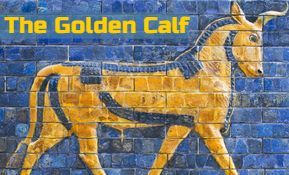
Shlach Lecha: How Could They Doubt Hashem?
How could the spies,10 tzaddikim, doubt Hashem's promise to bring them safely to Eretz Yisrael?! In contrast, Rachav, a baalat teshuva, had complete emuna in Hashem. How can that be?

Where Are You Coming From?
“Hashem spoke to Moshe (Moses), saying, ‘Send forth men, if you please, and let them spy out the Land of Canaan that I give to the Children of Israel’” (Bamidbar 13:2).
This verse implies that God gave Moshe permission to send the spies, but left the decision up to him. In Devarim 1:21-23, the Torah provides further information on the sequence of events that led to Moshe sending the spies to the Land of Israel. In both chapters, the Sages and Rashi explain that the people came to Moshe and requested that he dispatch spies to explore the Land of Canaan and report back to them. Moshe consulted God, Who said: “I have told them the Land is good. But since they question Me, I will let them test My veracity, at the risk of being misled and losing their chance to enter the Land.”
Rabbi Yerucham Lebowitz, the Mashgiach of Yeshivat Mir in Europe, points out that this was the sin of the Dor HaMidbar, the Generation of the Desert. The Generation of the Desert witnessed the splitting of the Sea and the revelation at Mount Sinai, and many more miracles. Because they were on such a lofty spiritual level, the slightest deviation from complete trust in God, as demonstrated by their request, led to their downfall.
This follows the principle elucidated by the Sages: “One who desires to defile himself is given permission by Heaven.” Although the spies were some of the greatest men of their generation, their greatness did not protect them.
In contrast to the spies’ downfall, this week’s Haftarah (Yehoshua 2:1-24) describes the events that occurred forty years after the spies’ sinned. Rachav, a Canaanite woman innkeeper, was willing to risk her life to protect Yehoshua’s (Joshua) spies from capture. Rachav saved their lives because she fully believed that the Children of Israel would conquer the Land and inherit it. Her belief was based on what she had heard: “For we have heard how Hashem dried up the water of the Sea of Reeds before you when you came out of Egypt, and what you did to the two Amorite kings across the Jordan — to Sichon and to Og — whom you utterly destroyed” (Yehoshua 2:10).
On the one hand, we find distinguished men, leaders of Israel, ‘the cream of the crop,’ who had personally witnessed the miracles of the Exodus and heard the voice of God on Mount Sinai, fall into the category of “those who come to defile themselves” and lost Divine Assistance against the wiles of the yetzer hara because of their slight deviance in emuna, faith.
On the other hand stood Rachav, a woman steeped in the depravity of an immoral nation. She never saw miracles or personally witnessed the greatness of Hashem. However, because she earnestly sought to move closer to Hashem she came into the category of “one who seeks to purify himself is assisted by Heaven.” Because she sought to move closer, she believed the reports that she had heard and achieved a tangible level of faith in the Jews’ eventual conquest.
The Redwood and the Sapling
Rabbi Yitzchak Blazer used a metaphor to explain the above idea: An extremely wealthy man in town began a downward spiral in his business affairs. Without fail, everything he did turned sour. Despite this problem, he remained wealthy. On the other hand, a desperately poor man began to see a run of good fortune. Everything he touched turned to gold. Who would you choose to invest your funds in?
To put it in more modern terms, no doubt an investor will choose the “small cap” stock that is growing by leaps and bounds, with a secure earning potential, over the “large cap” Dow Jones conglomerate that is heading towards bankruptcy.
Nature consists of growth and deterioration. A tiny seed has the potential to become a mighty redwood tree, taller than a skyscraper. Once it is fully grown, however, it begins to deteriorate. A tiny sapling that has just begun to pierce above the soil has greater value than a grand and mighty redwood tree that is rotting. Although the mature tree is more important, the sapling has greater potential.
These two forces are equally prevalent in the spiritual world. The spies were great men of spirit, but as a result of their choosing to “defile themselves,” they deteriorated. God said: “But since they question Me, I will let them test My veracity, at the risk of being misled and losing their chance to enter the Land.” On the other hand, Rachav had just started the path of spiritual growth, and was therefore not vulnerable to the test of being misled.
Even after their faulty decisions, the spies were still spiritual giants who towered above someone like Rachav. The difference, however, was that they were “rotting” while she was “growing.” Because of this, she was placed in a situation where she was granted Divine assistance to grow and not fall into error, while they deteriorated to the point where they denied God, as it is said: “But the men who had ascended with him said: ‘We cannot ascend to that people for they are too strong for us’” (Bamidbar 13:31). The Sages explain: “They meant that the inhabitants of the Land were stronger than God, as if it could be said” (Sota 35a).
Rabbi Yisroel Salanter quotes: “For Israel is a lad and I loved him” (Hoshea 11). He explains that the Jewish people are praised because they maintain the youthful aspect of spiritual growth, like a “lad” who has just begun to learn and grow. As a result, God harbors a special love for them. While the world generally honors the great and mighty “redwoods,” the Jewish way is to appreciate the “saplings” that are beginning their spiritual journey more than the huge trees that have begun to deteriorate.
It’s clear that we must continuously strive to remain a “lad” and be committed to growth, no matter where we stand on the ladder of achievement. Stagnation is public enemy number one! (Daat Chachmah U’Mussar I, pg. 216).
God Helps Those who Help Themselves
Rabbi Yechezkel Levinstein, the Mashgiach of Ponevezh Yeshiva, delves even deeper into the reason for the spies’ sin. The spies were biased because they thought they would lose their positions as tribal leaders if the Jews were to enter the Land of Israel. This bias was the cause of their evil report against the Land.
But what did they think they could gain by dissuading the Jews from entering the Land? Could they remain in the desert forever? And even if they were to return to Egypt, would they remain leaders?
Upon their return, the spies reported: “The land we passed through to explore is a land that consumes its inhabitants, and all the people we saw in it are men of stature. There we saw the giants, the sons of Anak, descended from the giants. In our eyes, we seemed like grasshoppers, and so we were in their eyes” (Bamidbar 13:32-33). Why were the people frightened by the spies’ report? They had witnessed the miracles of the Ten Plagues and the destruction of the Egyptian army at the Sea of Reeds only a few months before. Why did they suddenly lose faith in God’s power?
The nation’s response was devastating. It was as if they were anticipating a catastrophe: “The entire community raised their voices and shouted, and the people wept on that night” (Ibid. 14:1). They came to a rebellious conclusion: “If only we had died in the land of Egypt, or if only we had died in this desert. Why does Hashem bring us to this land to fall by the sword; our wives and children will be as spoils. Is it not better for us to return to Egypt?” (Ibid. 2-3). How could the Children of Israel forget that Hashem controls the world?
Rashi brings in the following verse to explain: “Moshe consulted God, Who said: ‘I have told them the Land is good. But since they question Me, I will let them test My veracity, at the risk of being misled and losing their chance to enter the Land.’” This means that God removed His Divine assistance from them.
Rabbi Moshe Luzzato, the Ramchal, explains how this works: “Clearly even if one remains in control of himself, it is not within his power to save himself without the help of the Holy One. For the yetzer hara, evil inclination, is extremely persistent, as it states (Tehillim 37:32), “The wicked one looks to the righteous and seeks to kill him; God will not leave him’” (Mesillat Yesharim 2).
Even if we consistently watch ourselves, we cannot overcome the yetzer hara on our own. However: “If a man watches over himself, the Holy One helps him, and he is saved from the yetzer hara” (Ibid.).
The Generation of the Desert did not rely on Hashem when He told them that the Land was good, and because of that Hashem removed His Divine assistance from them. Without God’s help, they were liable to fall into even such an absurd trap as the spies’ evil report. Without God’s help, man is foolish and remembers nothing. Therefore, even after witnessing all the miracles in Egypt and in the desert they were frightened by the spies’ slander: “The people who inhabit the land are mighty, and the cities are extremely huge and fortified, and there we saw even the offspring of the giant” (Bamidbar 13:28).
The incident of the spies reinforces the wise words of the Ramchal: “But if he gives no heed to himself, the Holy One will certainly not watch over him; for if he does not pity himself, who should pity him? As Our Sages of blessed memory have said (Berachot 33a), ‘It is forbidden to pity anyone who has no understanding,’ and (Avot 1:14), ‘If I am not for myself, who will be for me?’” (Mesillat Yesharim 2).
It states in the Shemoneh Esrei: “O King, Helper, Shield, and Savior.” If we work on ourselves, and make ourselves into servants of the King, He will be our Helper. But we must put in the effort to merit Divine assistance. This is the meaning of the commandment: “Choose life;” our job is to choose life and then Hashem will help us in every way we turn. (Kovetz Inyanim 5728).
Undoubtedly someone who is new to Jewish observance has special Divine assistance to help him in his spiritual growth. May it be Hashem’s will that we all retain our commitment to spiritual growth throughout our entire lives and may we be privileged to receive Divine assistance in overcoming the challenges we face daily.











Tell us what you think!
Thank you for your comment!
It will be published after approval by the Editor.